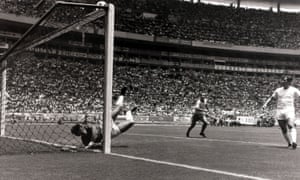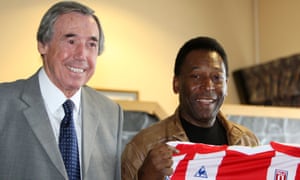[ad_1]
Perfection means different things to different people. To some, its pursuit invests life with rich meaning, nobility even, while others merely see a misery-inducing, distinctly Sisyphean, obsession.
Most regard it as subjective but, just occasionally, the rarest of moments offer an objective definition. Fifty years ago on Sunday Gordon Banks’s split second of sheer brilliance melded flawlessness, completeness and excellence in one single gravity-defying save from Pelé.
It came on a sun-baked day in the western Mexican city of Guadalajara – the “home” of tequila and mariachi music – during the group stage of the 1970 World Cup. A pace-suffused Brazil beat England 1-0 courtesy of Jairzinho’s winner but the scoreline did not provide the game’s abiding memory.
Archive television footage shows a threadbare pitch and a blonde Englishwoman in the crowd wearing an extraordinary nose guard, presumably to offer protection from the unforgiving UV rays.
Then the camera switches to Pelé arching his back. It captures his neck muscles flexing as he unleashes the most powerful of goal-bound headers only for Banks to make a mockery of the rules governing physics and human physiology.
By twisting with incredible rapidity in mid-air and extending the fingers of his right hand to scoop the ball from behind, before somehow flicking it upwards, around the goal frame and away for a corner, he elevated goalkeeping to an art form. It may not have been the finest save in football history but it is arguably the most memorable.
As Pelé’s forehead connected with Jairzinho’s looping cross the Brazilian screamed: “Gol.” Instead a glorious collision of physical speed, alacrity of thought and acrobatic reach ensured England’s goalkeeper propelled himself across his goalmouth to produce one of the standout sporting moments of the 20th century.
Banks, who died in 2019 aged 81, was already revered for his part in England’s 1966 World Cup triumph and would, later, confound medical opinion by starring for Fort Lauderdale Strikers in the USA despite having lost sight in an eye following a car crash. But Guadalajara eclipsed everything.
At the time everyone was so preoccupied with defending the ensuing corner that the goalkeeper received a rather perfunctory head pat from Alan Mullery and a hair ruffle followed by a bottom pat from Bobby Moore. “You’re getting old, Banksy,” said England’s captain. “You used to hold on to them.”
In contrast, Pelé – the undoubted star of a truly fabulous Brazil side – never underestimated Banks’s almost incomprehensibly razor-sharp reflexes.
“I hit that header exactly where I wanted it and I was ready to celebrate,” he recalled following the death of his one-time nemesis and, later, good friend. “But then Banks appeared in my sight, like a kind of blue phantom. He came from nowhere and he did something I didn’t feel possible. He pushed my header, somehow, up and over. I couldn’t believe what I saw. I can’t believe how he moved so far, so fast.”

That stop would become a lodestar for future cohorts of young goalkeepers, transcending generations. Football, by then around a century old, had always been punctuated by seemingly impossible saves but this was different.
It came against the Brazilian hyped, deservedly, as the planet’s best player, in front of an international audience relishing the first World Cup to be televised in colour. Nations were mesmerised by a clash of two of the game’s historic heavyweights.
When Carlos Alberto’s wonderful pass with the outside of a boot picked out Jairzinho and the winger accelerated inside Terry Cooper in an irresistible blur of yellow, Pelé rose above all comers, appearing somehow to be suspended in mid-air as he anticipated the cross.
Little did he know that Banks, decked in royal blue, was about to complete the work begun by the outstanding, ground-breaking Russian goalkeeper Lev Yashin in revolutionising perceptions of their craft. No matter that, after England’s goalkeeper was sidelined by food poisoning, Sir Alf Ramsey’s side lost the quarter-final against West Germany, goalkeeping had been glamourised.
“People always ask me about that save,” Pelé reflected. “Yet while it was indeed phenomenal, my memory of Gordon is defined by his friendship. He was a kind and warm man who gave so much. I’m glad he saved my header; it was the start of a friendship I’ll always treasure.”
In 2003 Banks offered Observer Sport Monthly a detailed account of events after the ball bounced down hard into the ground two yards in front of the goalline on a seemingly inexorable journey towards the top corner. “That save was the best I ever made but, to start with, I didn’t even realise I’d made it at all,” he said. “I heard Pelé shout ‘goal’ followed by a massive, almost deafening, roar. Even though I’d got a hand to it, I thought he must have scored.
“Then I realised the crowd were cheering for me. Bobby Moore ruffled my hair. I couldn’t believe it. But it was still 0-0 and we had a corner to defend. As I got to my feet I tried to look as nonchalant as possible, as if to say: ‘I make that sort of save all the time.’
“That Brazil team is the greatest to ever play the game and not a day goes by when I don’t get asked about it. I was positioned at the near post, a yard off my line, anticipating the cross. Bobby Moore moved to cover for Cooper, which left Tostão unmarked and Rivelino at the far post. Jairzinho ignored them both, imagine that, and picked out Pelé, who was racing into the box. As he rose to head the ball I started moving across my line. This was where my training paid off.”

The idea that sports science is a 21st-century innovation is debunked by the meticulousness of preparations which ensured Banks prevented the ball rebounding conveniently for Pelé to score from a potential rebound. “I’d worked hard prior to the 1970 World Cup,” he said. “The heat and humidity in Mexico meant the ball moved around in the air and the pitches were extremely hard, so any ball bouncing in front of you was nasty.
“I knew his header was going to bounce quite high, so I not only flung myself down but slightly backwards. I managed to get my fingertips to the ball and it went straight up into the air and over the bar.”
That redefinition of perfection helped ensure Banks became a six times recipient of Fifa’s goalkeeper of the year award but his club career was spent in the less starry environs of Chesterfield, Leicester and Stoke. The 1972 League Cup lifted at Stoke represented his sole domestic prize.
Nonetheless, his seemed a charmed life. Fragility never seemed remotely part of Banks’s personal equation until October 1972 when his Ford Consul collided head-on with a van at a sharp bend following afternoon physiotherapy on a shoulder injury. Blinded in one eye, he retired the following summer only to subsequently make that incredible comeback with Fort Lauderdale. As Pelé put it: “Gordon had magic hands.”
[ad_2]
Source link